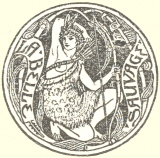This eBook was produced by Les Bowler, St. Ives, Dorset.
CASSELL’S NATIONAL LIBRARY.
The Task
AND OTHER POEMS
BY
WILLIAM COWPER.
CASSELL & COMPANY, Limited:
LONDON, PARIS,NEW YORK &MELBOURNE.
1899.
INTRODUCTION.
After the publication of his“Table Talk” and other poems in March, 1782, WilliamCowper, in his quiet retirement at Olney, under Mrs.Unwin’s care, found a new friend in Lady Austen. Shewas a baronet’s widow who had a sister married to aclergyman near Olney, with whom Cowper was slightlyacquainted. In the summer of 1781, when his first volumewas being printed, Cowper met Lady Austen and her sister in thestreet at Olney, and persuaded Mrs. Unwin to invite them totea. Their coming was the beginning of a cordialfriendship. Lady Austen, without being less earnest, had aliveliness that satisfied Cowper’s sense of fun to anextent that stirred at last some jealousy in Mrs. Unwin. “She had lived much in France,” Cowper said,“was very sensible, and had infinite vivacity.”
The Vicar of Olney was in difficulties, with his affairs inthe hands of trustees. The duties of his office were entirelydischarged by a curate, and the vicarage was to let. LadyAusten, in 1782, rented it, to be near her new friends. There was only a wall between the garden of the house occupied byCowper and Mrs. Unwin and the vicarage garden. A door wasmade in the wall, and there was a close companionship ofthree. When Lady Austen did not spend her evenings withMrs. Unwin and Cowper, Mrs. Unwin and Cowper spent their eveningswith Lady Austen. They read, talked, Lady Austen played andsang, and they all called one another by their Christian names,William, Mary (Mrs. Unwin), and Anna (Lady Austen). In apoetical epistle to Lady Austen, written in December, 1781,Cowper closes a reference to the strength of their friendshipwith the evidence it gave,—
“That Solomon has wisely spoken,—
‘A threefold cord is not soon broken.’”
One evening in the summer of 1782, when Cowper waslow-spirited, Lady Austen told him in lively fashion the storyupon which he founded the ballad of “JohnGilpin.” Its original hero is said to have been a Mr.Bayer, who had a draper’s shop in London, at the corner ofCheapside. Cowper was so much tickled by it, that he layawake part of the night rhyming and laughing, and by the nextevening the ballad was complete. It was sent to Mrs.Unwin’s son, who sent it to the Public Advertiser, wherefor the next two or three years it lay buried in the“Poets’ Corner,” and attracted no particularattention.
In the summer of 1783, when one of the three friends had beenreading blank verse aloud to the other two, Lady Auste

